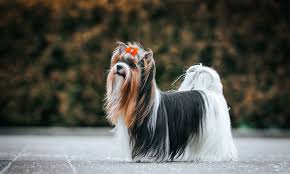
Biewer Terrier
Conditions of detention
Biewer Terriers are highly adaptable and can thrive in both urban and rural environments. They are well-suited for apartment living due to their small size and moderate exercise needs.
Useful Fact: Regular walks and indoor playtime are sufficient to meet their exercise requirements, making them ideal for city dwellers.
Nutrition and diet
A balanced diet with high-quality dog food that includes proteins, fats, and carbohydrates is essential for Biewer Terriers. Fresh meat, vegetables, and grains can supplement their diet.
Useful Fact: Due to their small size, it’s important to monitor their food intake to prevent obesity and ensure they receive the right balance of nutrients.
Health
Biewer Terriers are generally healthy dogs but can be prone to certain health issues such as dental problems, luxating patellas, and liver shunts. Regular veterinary check-ups are crucial.
Useful Fact: Regular dental care, including brushing and professional cleanings, is important to prevent dental disease.
Grooming and care
The Biewer Terrier has a long, silky coat that requires regular grooming to prevent matting and tangling. Brushing several times a week and professional grooming every 4-6 weeks are recommended.
Useful Fact: Their coat is hypoallergenic, making them a good choice for people with allergies, but it requires consistent grooming to maintain its appearance.
Education and training
Biewer Terriers are intelligent and eager to please, making them relatively easy to train. Early socialization and consistent, positive reinforcement training methods are crucial.
Useful Fact: They respond well to training that includes a variety of activities and challenges, keeping them mentally stimulated and engaged.
Toys and entertainment
Interactive toys, puzzle games, and activities that involve fetching and agility are excellent for keeping a Biewer Terrier mentally and physically stimulated.
Useful Fact: They enjoy games that challenge their intelligence and agility, reflecting their playful and energetic nature.
Safety
A secure, fenced yard is important for Biewer Terriers to prevent them from wandering off. Supervision during outdoor activities is recommended due to their small size and potential vulnerability.
Useful Fact: Their small size makes them susceptible to injuries, so it’s important to supervise them around larger dogs and during playtime.
Accessories
Sturdy collars and leashes, comfortable bedding, grooming tools, and interactive toys are essential accessories for a Biewer Terrier. Crate training can also be beneficial for travel and safety.
Useful Fact: Reflective gear enhances safety during evening or early morning walks, making them more visible to others.
Socialization
Early and ongoing socialization with other dogs, animals, and people is important for Biewer Terriers. It helps them develop a well-rounded temperament.
Useful Fact: Regular socialization helps prevent shyness or anxiety and ensures they are friendly and adaptable in various situations.
Travel and Transportation
Biewer Terriers can adapt to travel if introduced gradually. Secure crates or harnesses in vehicles ensure their safety during trips.
Useful Fact: Their small size makes them convenient for travel, but ensuring their comfort and safety during trips is crucial.
Behavior and psychology
Biewer Terriers are known for their cheerful, affectionate, and playful nature. They require regular mental and physical stimulation to prevent boredom and destructive behavior.
Useful Fact: Their strong bond with their family makes them excellent companions, but they can experience separation anxiety if left alone for long periods.
Legal aspects
Owners should be aware of local regulations regarding pet ownership, including licensing, leash laws, and specific breed regulations.
Useful Fact: Keeping vaccination records and adhering to local pet laws ensures the safety and legality of owning a Biewer Terrier.


